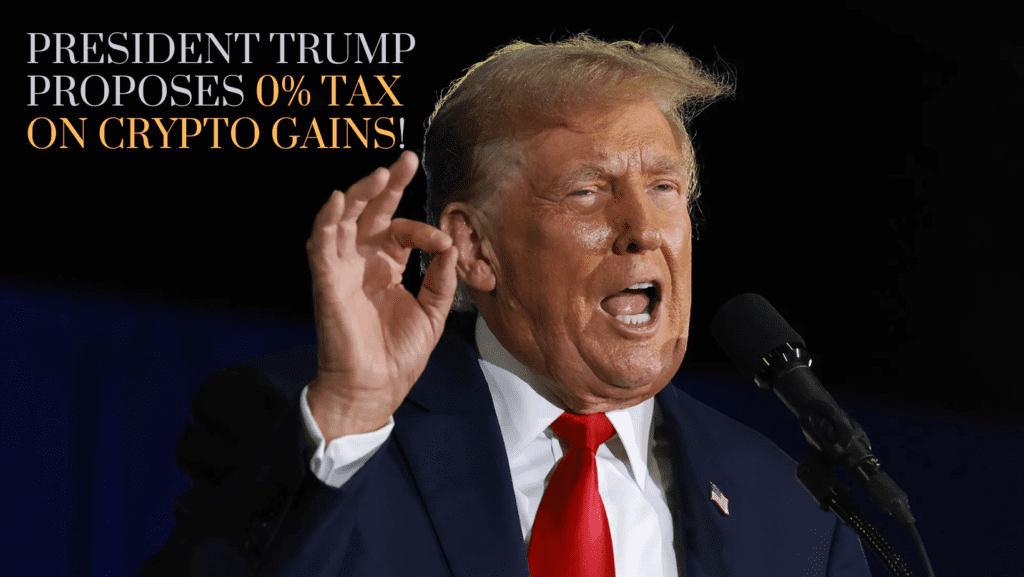As the cryptocurrency market continues to gain momentum, political leaders are starting to pay attention, and recent developments have captured the interest of crypto enthusiasts and investors alike. Newly elected President Donald Trump recently announced a proposal for a 0% tax on cryptocurrency gains, sparking significant discussion across financial sectors and among the wider public. This bold move, if implemented, could have far-reaching effects on the future of the crypto industry in the United States, potentially positioning it as a global hub for digital asset investment.
Let’s dive deeper into what this proposal could mean for crypto holders, the industry, and the economy as a whole.
The Proposal: A 0% Tax on Crypto Gains
In a speech aimed at energizing his political base, Trump outlined his vision to eliminate taxes on cryptocurrency gains. The policy is centered on fostering financial freedom and encouraging innovation by allowing individuals and businesses to retain 100% of their crypto profits without the burden of capital gains tax. By reducing regulatory pressures on crypto earnings, the goal would be to attract more investors to the U.S. crypto market, driving growth and making the country a center for blockchain innovation.
Although the proposal has yet to gain formal legislative backing, Trump’s declaration has already generated both excitement and skepticism within the financial and crypto communities.
What 0% Tax on Crypto Gains Could Mean for Investors
- Increased Investor Interest: If passed, a 0% tax policy could draw a wave of new investors into the market, particularly those who have previously been hesitant due to the tax implications of high-frequency trading. This could lead to an influx of capital in the U.S. crypto market, further solidifying the United States’ position in the global cryptocurrency landscape.
- Encouragement for Long-Term Holdings: With no taxes on crypto profits, investors may be more inclined to hold their assets longer. This stability could decrease the frequency of short-term trading, potentially resulting in less market volatility. By holding assets for extended periods, investors would also likely benefit from the market’s long-term growth trends.
- Institutional Adoption: Many institutions have shown interest in cryptocurrency but remain wary due to regulatory uncertainty and tax obligations. A tax-free policy on crypto gains could encourage institutions to allocate larger portions of their portfolios to digital assets, opening the doors for broader institutional adoption and acceptance of cryptocurrency.
Potential Economic Impacts
- Increased Capital Flow: The U.S. could become one of the most attractive markets for crypto trading and investment, bringing in both local and international funds. This could strengthen the U.S. dollar’s position in the crypto market and create positive ripple effects across the economy, from job creation to technological advancements.
- Boost to Blockchain Innovation: Tax incentives on crypto gains could encourage the growth of blockchain projects and tech companies, fostering a more innovative and competitive environment. Startups, in particular, may benefit from this proposal, as they could avoid the capital gains tax on their holdings, allowing them to reinvest and grow more rapidly.
- Critics’ Concerns: Some economists argue that eliminating the tax on crypto gains could have drawbacks. For example, they point out the potential for revenue loss to the government and the risk of a speculative bubble. In this scenario, the U.S. Treasury would lose a source of tax revenue, which could impact funding for public services or infrastructure. Others worry that a tax-free crypto market might invite excessive speculation, potentially destabilizing the broader economy.
Addressing Regulatory Challenges
In the wake of Trump’s proposal, the U.S. government would need to navigate various regulatory challenges. Implementing a 0% tax policy on crypto gains may require federal agencies, such as the Securities and Exchange Commission (SEC) and the Internal Revenue Service (IRS), to reconsider their current stance on digital assets. A significant policy shift would necessitate collaboration between these agencies, lawmakers, and industry leaders to establish a new regulatory framework that balances innovation with investor protection.
Critics argue that completely removing taxes on crypto gains could make enforcement of other regulations more difficult, potentially raising the risk of illicit financial activity. Any such policy would need a framework for ensuring accountability while promoting transparency and compliance with anti-money laundering (AML) and know-your-customer (KYC) guidelines.
What’s Next?
As the proposal gains traction, crypto investors and industry stakeholders are watching closely. The next steps will likely involve further discussions among lawmakers, regulatory bodies, and industry leaders. If Trump’s 0% crypto gains tax proposal becomes a reality, it could create a shift in how digital assets are viewed and managed in the United States, potentially ushering in a new era for the crypto economy.
However, it’s important to consider that any sweeping tax policy would likely face opposition and rigorous debate before being enacted. As always, those with vested interests in cryptocurrency should stay informed on upcoming legislative developments, as the outcome could greatly impact their financial strategies.
Conclusion: A Bold Move with Major Implications
President Trump’s 0% tax proposal on crypto gains has opened up the conversation about the future of digital assets in the United States. While it’s too early to determine the full impact, this policy shift could accelerate crypto adoption, create economic opportunities, and establish the U.S. as a crypto-friendly hub. However, it also raises questions about the balance between encouraging innovation and ensuring fiscal responsibility.
For now, the proposed 0% tax on crypto gains remains an ambitious vision with the potential to shape the future of crypto in the U.S. Whether this vision will materialize depends on the complex intersection of policy, regulation, and public opinion. Stay tuned as this story unfolds, as it could redefine the cryptocurrency landscape and the way Americans approach digital investments.
This development reminds us that the crypto market is constantly evolving, and government policies are beginning to catch up. Keep an eye on Coin Scoop Daily for updates on this proposal and more insights into how regulatory changes could affect the world of cryptocurrency investing!
I am Pawan Kashyap currently living in Amritsar. I always try to grab new things from the cryptocurrency market. From my observations and trends in the market, I always try to provide the best and accurate information in the form of articles from this blog. Follow us on Facebook, Instagram, and Twitter to join us.



